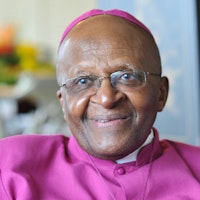Forgiveness is one of the key ideas in this world… Without forgiveness there is no future.
Desmond Tutu

Without Forgiveness
Topic: Virtue, Morality, & Ethics
Forgiveness is one of the key ideas in this world. Forgiveness is not just some nebulous, vague idea that one can easily dismiss. It has to do with uniting people through practical politics. Without forgiveness there is no future.
Desmond Mpilo Tutu (7 October 1931 – 26 December 2021) was a distinguished South African Anglican Archbishop and theologian known globally for his dedicated work as an anti-apartheid and human rights activist. His involvement in the fight against racial segregation in South Africa during the apartheid era was steadfast and resulted in significant contributions to the nation's quest for racial equality. In recognition of his efforts, Tutu was awarded the Nobel Peace Prize in 1984. His leadership and moral courage were instrumental in transitioning South Africa towards a more reconciled society.
Tutu was deeply religious and his belief in God, perceived as both a Heavenly Father and Heavenly Mother, played a major role in his life and advocacy. This belief, which extended beyond traditional Anglican theology, played a significant role in his stance on gender equality. His faith, therefore, wasn't simply a personal doctrine, but it also guided his public advocacy and influenced his approach towards human rights.
Tutu was also a strong proponent of Ubuntu, an African philosophy that stresses the interconnectedness of humanity. This concept aligns with the idea that one's well-being is tied to the well-being of others. Tutu's acknowledgment of advancements in human rights and his continued efforts for improvement were reflective of this philosophy. Despite the challenges he faced during the apartheid era, Tutu remained committed to advocating for a world where peace, justice, and dignity were accessible to everyone. Through his lifetime, Desmond Tutu left an enduring mark on society, and his legacy continues to inspire those who pursue equality and human rights.
Without Forgiveness There Is No Future
Tutu, Desmond. “Without Forgiveness There Is No Future.” Exploring Forgiveness, edited by Robert D. Enright and Joanna North, University of Wisconsin Press, 1998, p. xiii.

Desmond Tutu
Theme: Forgiving

About This Archbishop Desmond Tutu Quotation [Commentary]
Archbishop Desmond Tutu begins with clarity: “Forgiveness is one of the key ideas in this world.” It is not, he writes, “some nebulous, vague idea that one can easily dismiss.” He brings forgiveness out of the realm of abstraction and into daily, lived reality. As he states, it “has to do with uniting people through practical politics.” Forgiveness, in his view, is not just about individual healing—it is essential to how people relate, rebuild trust, and live together after harm has been done.
This understanding grows out of Archbishop Desmond Tutu’s work in post-apartheid South Africa, where reconciliation required the truth to be spoken and the possibility of forgiveness to be kept open. The sentence “Without forgiveness there is no future” does not come as a conclusion, but as a warning. Where forgiveness is absent, the past continues to shape the present through resentment and division. When it is present, even in difficult circumstances, people can begin again—together.
Forgiveness, as Archbishop Desmond Tutu describes it, involves facing real harm. It is not about forgetting, nor about denying justice. It is about choosing a way forward that does not repeat cycles of retaliation. By saying “forgiveness is one of the key ideas,” he emphasizes its necessity for human survival. And in naming its role in “practical politics,” he grounds it in the shared life of communities. Forgiveness, then, is both a personal act and a public necessity—a key idea without which, as he writes, “there is no future.”
The Book of Forgiving: The Fourfold Path for Healing Ourselves and Our World
“Ultimately, forgiveness is a choice we make, and the ability to forgive others comes from the recognition that we are all flawed and all human. We all have made mistakes and harmed others. We will again. We find it easier to practice forgiveness when we can recognize that the roles could have been reversed.”
―Desmond Tutu, The Book of Forgiving: The Fourfold Path for Healing Ourselves and Our World.
“Forgiveness does not relieve someone of responsibility for what they have done. Forgiveness does not erase accountability. It is not about turning a blind eye or even turning the other cheek. It is not about letting someone off the hook or saying it is okay to do something monstrous. Forgiveness is simply about understanding that every one of us is both inherently good and inherently flawed. Within every hopeless situation and every seemingly hopeless person lies the possibility of transformation.”
―Desmond Tutu, The Book of Forgiving: The Fourfold Path for Healing Ourselves and Our World.
“We are not responsible for what breaks us, but we can be responsible for what puts us back together again. Naming the hurt is how we begin to repair our broken parts.”
―Desmond Tutu, The Book of Forgiving: The Fourfold Path for Healing Ourselves and Our World.
“Transformation begins in you, wherever you are, whatever has happened, however you are suffering. Transformation is always possible. We do not heal in isolation. When we reach out and connect with one another—when we tell the story, name the hurt, grant forgiveness, and renew or release the relationship—our suffering begins to transform.”
―Desmond Tutu, The Book of Forgiving: The Fourfold Path for Healing Ourselves and Our World.
“Forgiveness is truly the grace by which we enable another person to get up, and get up with dignity, to begin anew. To not forgive leads to bitterness and hatred. Like self-hatred and self-contempt, hatred of others gnaws away at our vitals. Whether hatred is projected out or stuffed in, it is always corrosive to the human spirit.”
―Desmond Tutu, The Book of Forgiving: The Fourfold Path for Healing Ourselves and Our World.
“All modern humans are related to what scientists call “Mitochondrial Eve.” This refers to our common matrilineal ancestor. She lived approximately 200,000 years ago and depending on how you estimate the length of a generation, we are only 5,000 to 10,000 generations from one another. To put it another way, each of us is a cousin of one another at most 10,000 times removed. And yes, Mitochondrial Eve lived in Africa, so, in a very real way, we are all Africans.”
―Desmond Tutu, The Book of Forgiving: The Fourfold Path for Healing Ourselves and Our World.
Related Quotes
Copyright © 2017 – 2025 LuminaryQuotes.com About Us